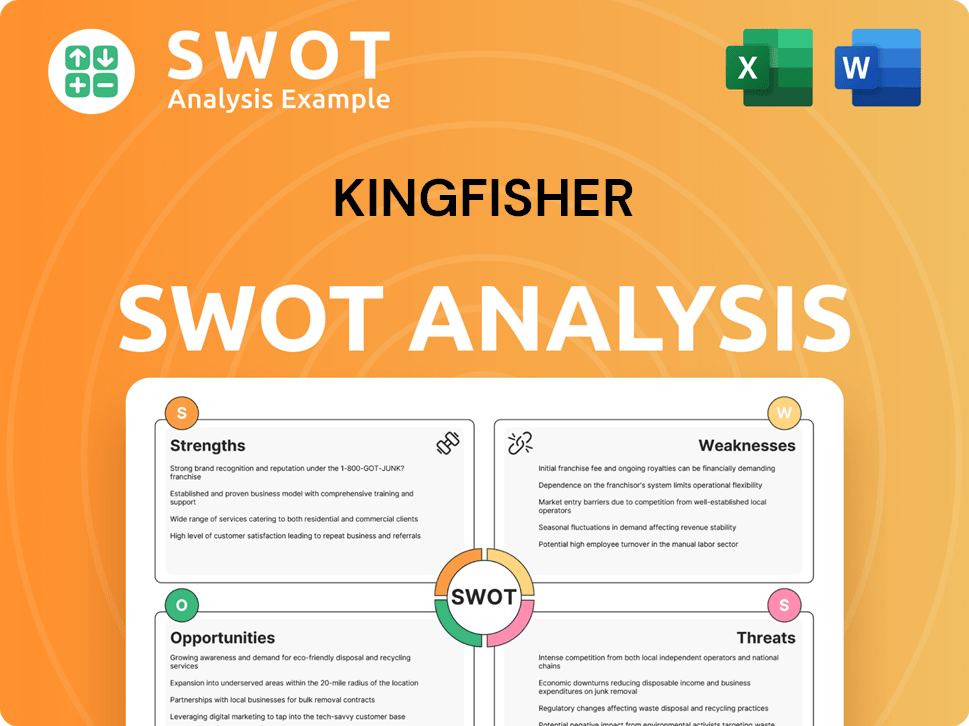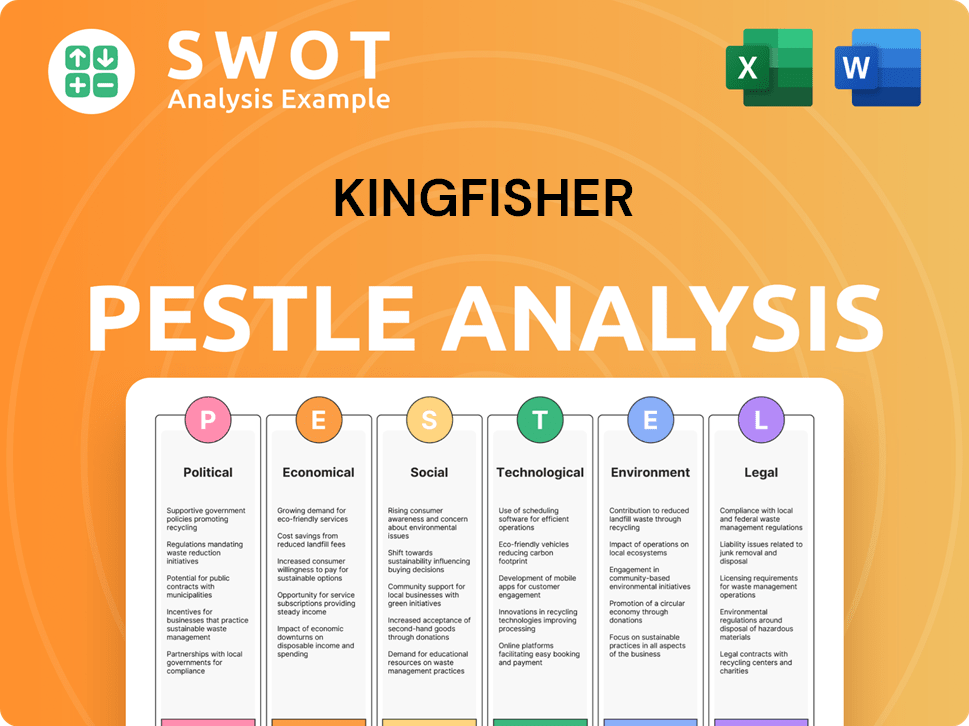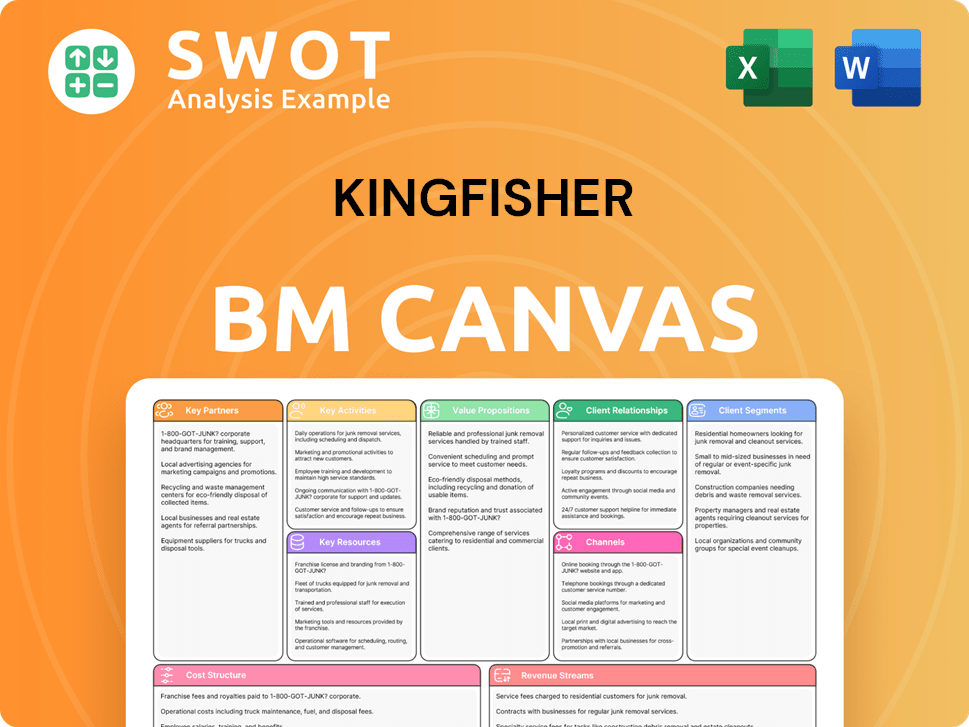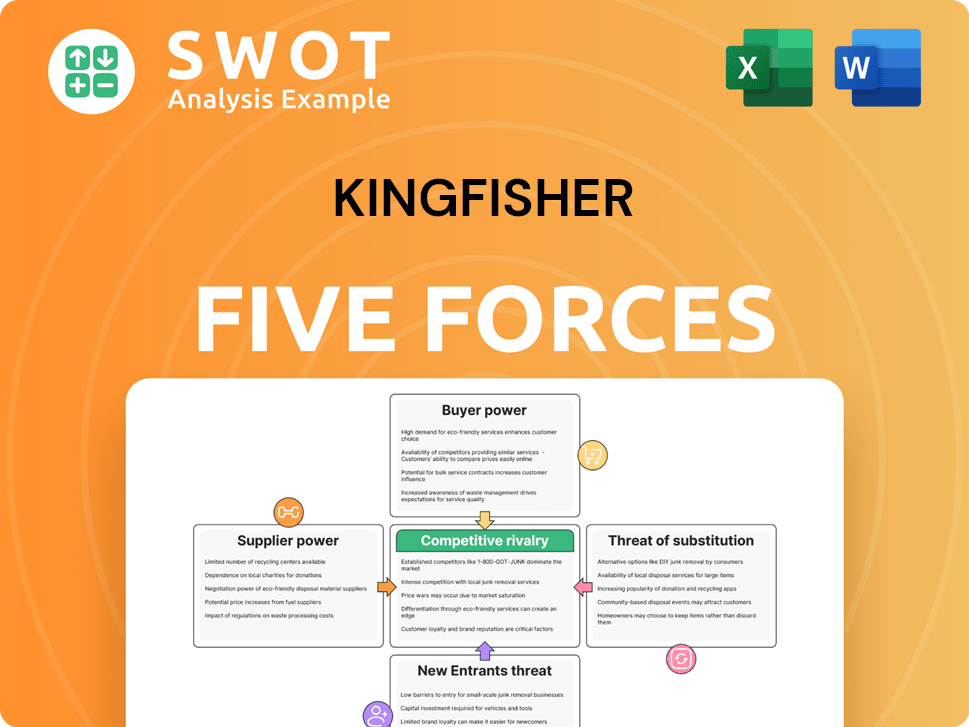Kingfisher Bundle
Unveiling Kingfisher's Guiding Principles: What Drives This Retail Giant?
Understanding a company's core principles is crucial for investors and strategists alike. Kingfisher Company, a leading force in the home improvement retail sector, operates under a defined set of values and aspirations that shape its business decisions.

Delving into the Kingfisher SWOT Analysis, mission, vision, and core values provides invaluable insights into its strategic direction and market positioning. These elements are not just abstract concepts; they are the very foundation upon which Kingfisher builds its business, fostering a culture of innovation and sustainability. Discover how Kingfisher's mission, vision, and core values influence its business objectives and strategic goals.
Key Takeaways
- Kingfisher's customer-centric mission, vision, and values drive its strategy and operations.
- Emphasis on quality, innovation, and sustainability positions Kingfisher for future growth.
- 'Powered by Kingfisher' strategy ensures agility and responsiveness to market changes.
- Q1 2025/2026 results show a return to sales growth and strong e-commerce performance.
- Guiding principles enable Kingfisher to adapt and achieve sustained market share gains.
Mission: What is Kingfisher Mission Statement?
The Kingfisher Company's mission is centered around providing customers with high-quality home improvement products and services, emphasizing innovation, quality, and sustainability.
Let's delve into the specifics of the Kingfisher Mission.
Kingfisher places a strong emphasis on understanding and meeting customer needs. This customer-centric approach is evident in their dedication to providing excellent service and high-quality products. This focus is a cornerstone of their Kingfisher Strategy.
A key element of the Kingfisher Mission is a commitment to product quality and continuous innovation. They invest significantly in research and development to create new and improved home improvement solutions. In 2023, Kingfisher invested approximately £90 million in R&D for product innovation.
Sustainability is a core component of Kingfisher's mission, with a focus on offering eco-friendly products and practices. As of late 2023, around 60% of their products had one or more sustainability credentials. This reflects Kingfisher's commitment to environmental responsibility.
Kingfisher operates internationally, serving customers across eight European countries. Their target customers include both consumers and trade professionals seeking home improvement products and services. Understanding their market is crucial for their Kingfisher Business.
Kingfisher's dedication to meeting customer needs is reflected in their customer satisfaction scores. In fiscal year 2023, they achieved a customer satisfaction score of 82%, highlighting their focus on customer experience. This is a key element of their Kingfisher Vision.
Kingfisher's unique value proposition lies in providing high-quality, innovative, and sustainable home improvement solutions. This approach helps them differentiate themselves in a competitive market. For more insights, explore the Competitors Landscape of Kingfisher.
This mission statement guides Kingfisher's operations, influencing its strategic goals and business objectives. The company's commitment to its customers, product quality, innovation, and sustainability are all integral to its long-term vision and core values. Understanding these elements provides a comprehensive view of Kingfisher's purpose and values.
Kingfisher SWOT Analysis
- Complete SWOT Breakdown
- Fully Customizable
- Editable in Excel & Word
- Professional Formatting
- Investor-Ready Format

Vision: What is Kingfisher Vision Statement?
Kingfisher's vision is to be the leading home improvement retailer, championing sustainability and responsible retailing practices.
Let's delve into the ambitious vision of Kingfisher, a company striving for leadership in the home improvement sector. This Kingfisher Company sets its sights on a future where market dominance is intertwined with a deep commitment to environmental stewardship and ethical business practices. This vision is not merely aspirational; it's backed by concrete, measurable goals and significant progress.
Kingfisher's vision statement clearly outlines its ambition to lead the home improvement market. This strategic focus is supported by continuous efforts to enhance customer experience through digital transformation and an omnichannel retail approach, which fosters customer loyalty and drives growth.
A key element of Kingfisher's vision is its commitment to sustainability. The company aims to significantly reduce its carbon footprint and increase the proportion of sustainable products, demonstrating a proactive approach to environmental responsibility.
Kingfisher has set specific, measurable goals to achieve its vision. For instance, the company aimed for a 40% reduction in carbon emissions by 2024 (compared to 2016 levels) and a target of 50% sustainable or recycled products by the end of 2024.
Kingfisher's commitment to reducing its environmental impact is evident in its achievements. The company has already reduced operational emissions by 62% since 2016/17, surpassing its 2025/26 science-based target ahead of schedule.
The company's focus on enhancing customer experience is evident in its Net Promoter Score (NPS). The goal is to increase the NPS to 60 by 2024, which reflects Kingfisher's dedication to customer satisfaction and loyalty.
Kingfisher's commitment to sustainability extends to its product offerings. The company's goal to have 50% of its products be sustainable or made from recycled materials by the end of 2024, up from approximately 30% in 2023, underscores its dedication to responsible retailing.
The Kingfisher Vision is a testament to the company's forward-thinking approach, combining ambitious market goals with a strong emphasis on environmental and social responsibility. This comprehensive strategy, driven by the Kingfisher Strategy, positions the company for long-term success. The Kingfisher Mission and Kingfisher Core Values further support this vision, guiding the company's actions and decisions. The company's commitment to improving its merchandise selection, digital engagement, and in-store experience is evidenced by a Net Promoter Score (NPS) of 50 in 2023, with a goal to increase this to 60 by 2024. This demonstrates a clear upward trajectory towards its sustainable retailing vision. The company's dedication to sustainability is not just a statement; it's a core component of its Kingfisher Business model and a key driver of its future growth.
Kingfisher PESTLE Analysis
- Covers All 6 PESTLE Categories
- No Research Needed – Save Hours of Work
- Built by Experts, Trusted by Consultants
- Instant Download, Ready to Use
- 100% Editable, Fully Customizable

Values: What is Kingfisher Core Values Statement?
Understanding the core values of Kingfisher plc is crucial to grasping its operational ethos and its approach to the home improvement market. These values are the bedrock upon which the company builds its relationships with customers, colleagues, and the wider world.
Customer Commitment is a cornerstone of Kingfisher's strategy, driving product development and fostering a service-oriented culture. This commitment is evident in efforts to enhance customer satisfaction, with an aim to increase their Net Promoter Score (NPS) from 50 in 2023 to 60 in 2024. This is achieved through improved merchandise selection, digital engagement, and in-store experiences.
Kingfisher places a high value on delivering high-quality products, ensuring rigorous standards across its supply chain. This commitment is reflected in product development, where over 90% of Kingfisher's private label products met or exceeded international quality benchmarks in 2023. Furthermore, they aim to reduce non-recyclable packaging by 25% by 2025.
Innovation is central to Kingfisher's mission, driving them to stay ahead in a dynamic market. This includes a focus on eco-friendly products, with a goal for 50% of products to be sustainable or made from recycled materials by the end of 2024. Kingfisher invested approximately £90 million in R&D focused on product innovation in 2023, showcasing their commitment to continuous improvement.
Kingfisher is deeply committed to sustainable practices, aiming to reduce environmental impact. This is evident in product development and business practices, with targets such as reducing carbon emissions by 40% by 2025 compared to 2016 levels, with a 25% reduction already achieved in 2022. They also aim for 100% of their products to be sustainably sourced by 2025, with 60% already meeting this criterion as of 2024.
These core values of the Kingfisher Company—Customer Commitment, Quality, Innovation, and Sustainability—shape its business practices and contribute to its unique position in the home improvement sector. These values are crucial to understanding how Kingfisher defines its mission, vision, and strategic goals. Next, we will explore how Kingfisher's mission and vision influence the company's strategic decisions.
How Mission & Vision Influence Kingfisher Business?
Kingfisher's Mission, Vision & Core Values of Kingfisher are not mere statements; they are the guiding principles that shape its strategic decisions and drive its business forward. The company's commitment to its mission and vision is evident in its actions and measurable outcomes, demonstrating a clear alignment between its aspirations and its operational strategies.
Kingfisher's focus on digital transformation directly reflects its mission to enhance customer experience and vision for market leadership. This is underscored by ambitious targets and significant investments in online platforms.
- Aiming for a 30% increase in online sales by the end of 2024.
- Online sales accounted for 19% of total sales in FY 24/25, up from 8% in 2019.
- Successful marketplace at B&Q, contributing to a 62% year-on-year growth in Group-wide marketplace Gross Merchandise Value (GMV) to £327 million.
- Launch of AI-powered digital assistants, such as 'Hello Casto' in Castorama France.
Kingfisher's strategy to serve trade customers aligns with its mission to cater to both consumers and trade professionals. This approach recognizes the value of trade customers and their contribution to sales.
Trade sales penetration increased by 4.9 points to 17.9% in FY 24/25. This growth is driven by tailored trade propositions across its banners, including TradePoint in the UK.
Kingfisher aims to double trade sales penetration in France and achieve at least 30% in Poland over the medium term, demonstrating a commitment to expanding its trade customer base.
Kingfisher's ambitious sustainability targets are a direct manifestation of its vision for responsible retailing. This commitment influences product development and operational practices.
Kingfisher has exceeded its 2025/26 science-based target for operational emissions, reducing Scope 1 and 2 carbon emissions by 62% since 2016/17, showcasing its commitment to environmental responsibility.
49.4% of its total Group sales in 2023/24 came from Sustainable Home Products (SHPs), with a target to reach 60% by the end of 2025/26, demonstrating a focus on eco-friendly products.
Kingfisher's strategic priorities, guided by its mission and vision, ensure that the company remains focused on long-term goals even amidst market fluctuations. The leadership's commitment to responsible business practices and energy efficiency underscores the importance of aligning day-to-day operations with the core mission and vision. The company's approach to innovation, its commitment to its customers, and its employee values are all influenced by the Kingfisher Mission, Kingfisher Vision, and Kingfisher Core Values. Read on to discover the Core Improvements to Company's Mission and Vision.
Kingfisher Business Model Canvas
- Complete 9-Block Business Model Canvas
- Effortlessly Communicate Your Business Strategy
- Investor-Ready BMC Format
- 100% Editable and Customizable
- Clear and Structured Layout

What Are Mission & Vision Improvements?
While Kingfisher's current statements effectively communicate their core purpose and aspirations, several improvements can align them with evolving market dynamics and industry best practices. These refinements would solidify Kingfisher's position as a forward-thinking leader in the home improvement sector.
To stay ahead, Kingfisher should explicitly incorporate 'smart homes' and interconnected living into its vision. This strategic move acknowledges the increasing integration of technology in the home improvement market and positions Kingfisher as a key player in this technological evolution. By 2025, the smart home market is projected to reach $163.6 billion globally, highlighting the importance of this integration.
Kingfisher can strengthen its mission by emphasizing community well-being beyond just improving homes. Highlighting contributions to healthier and more inspiring living spaces will resonate with consumers who prioritize holistic well-being. This approach aligns with the growing trend of conscious consumerism, where people seek brands that reflect their values.
Kingfisher should explicitly address the circular economy in its mission or vision. Emphasizing product lifecycle management, waste reduction, and promoting repair and reuse will differentiate Kingfisher in an environmentally conscious market. As of 2024, Kingfisher aims to ensure 100% of its products are sustainably sourced by 2025, with 60% already meeting this criterion, demonstrating a strong foundation for further circular economy initiatives.
Kingfisher can enhance its strategic goals by embracing advanced technologies like AI for personalized design and installation services. Adapting its mission and vision to address these emerging technologies will position Kingfisher as a holistic enabler of future-ready, sustainable, and technologically integrated homes. For more insights into Kingfisher's strategic direction, consider reading about Owners & Shareholders of Kingfisher.
How Does Kingfisher Implement Corporate Strategy?
The successful implementation of a company's mission, vision, and core values is crucial for achieving its strategic objectives and fostering a strong corporate culture. Kingfisher Company demonstrates this through a multifaceted approach that integrates these principles into its daily operations and long-term planning.
Kingfisher's mission and vision are actively demonstrated through strategic business initiatives. A key example is the expansion of its e-commerce capabilities and marketplace platforms, directly impacting its business objectives.
- E-commerce Growth: Group e-commerce sales penetration reached 19% in FY 24/25, a significant increase from 8% in 2019, with a long-term target of 30% of total sales.
- Marketplace Launch: The successful launch of the B&Q marketplace and its expansion to Castorama France in March 2024 broadened product ranges without requiring additional inventory.
- Digital Tools: Kingfisher's in-house data and AI team centrally develops and rolls out digital tools to boost sales and support customer-centric decision-making, showcasing their approach to innovation.
Leadership plays a pivotal role in reinforcing Kingfisher's mission, vision, and core values. CEO Thierry Garnier consistently communicates the 'Powered by Kingfisher' strategy, ensuring the company's strategic direction is understood throughout the organization.
Communication of the Kingfisher mission and vision extends to all stakeholders through various channels. Annual reports and investor presentations clearly articulate the company's strategic priorities and performance against them.
Kingfisher demonstrates a strong alignment between its stated values and actual business practices. The value of sustainability is a core component of Kingfisher's Business strategy.
- Sustainability Targets: Operational emissions were reduced by 62% since 2016/17, exceeding their 2025/26 science-based target.
- Sustainable Home Products (SHPs): SHPs accounted for nearly half (49.4%) of total Group sales in 2023/24, demonstrating their commitment to helping customers create greener homes.
- Customer Commitment: Kingfisher invested over £30 million in enhancing customer service experiences across stores and online platforms, reflecting Kingfisher's commitment to its customers.
Kingfisher utilizes formal programs and systems to ensure alignment across the organization. These initiatives foster a culture of efficiency, innovation, and social responsibility, supporting Kingfisher's company culture.
- Developer Experience Squad: Implemented to remove roadblocks for developers, fostering efficiency and innovation.
- Community Investment: £6.1 million invested in 2023/24, reaching 3.2 million people since 2016/17, underscoring their commitment to social responsibility.
For a deeper understanding of Kingfisher's financial performance and strategic initiatives, you can explore the Revenue Streams & Business Model of Kingfisher.
Kingfisher Porter's Five Forces Analysis
- Covers All 5 Competitive Forces in Detail
- Structured for Consultants, Students, and Founders
- 100% Editable in Microsoft Word & Excel
- Instant Digital Download – Use Immediately
- Compatible with Mac & PC – Fully Unlocked

Related Blogs
- What are Mission Vision & Core Values of Kingfisher Company?
- What is Competitive Landscape of Kingfisher Company?
- What is Growth Strategy and Future Prospects of Kingfisher Company?
- How Does Kingfisher Company Work?
- What is Sales and Marketing Strategy of Kingfisher Company?
- Who Owns Kingfisher Company?
- What is Customer Demographics and Target Market of Kingfisher Company?
Disclaimer
All information, articles, and product details provided on this website are for general informational and educational purposes only. We do not claim any ownership over, nor do we intend to infringe upon, any trademarks, copyrights, logos, brand names, or other intellectual property mentioned or depicted on this site. Such intellectual property remains the property of its respective owners, and any references here are made solely for identification or informational purposes, without implying any affiliation, endorsement, or partnership.
We make no representations or warranties, express or implied, regarding the accuracy, completeness, or suitability of any content or products presented. Nothing on this website should be construed as legal, tax, investment, financial, medical, or other professional advice. In addition, no part of this site—including articles or product references—constitutes a solicitation, recommendation, endorsement, advertisement, or offer to buy or sell any securities, franchises, or other financial instruments, particularly in jurisdictions where such activity would be unlawful.
All content is of a general nature and may not address the specific circumstances of any individual or entity. It is not a substitute for professional advice or services. Any actions you take based on the information provided here are strictly at your own risk. You accept full responsibility for any decisions or outcomes arising from your use of this website and agree to release us from any liability in connection with your use of, or reliance upon, the content or products found herein.